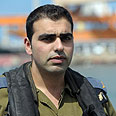
Snapir unit keeping watch over Gaza
As Israeli families gather together to read haggadah, Navy fighters make sure no boats or barrels of explosives will ruin holiday. IDF allows rare peak into lives of soldiers on small, speedy boats called 'hornets' without kitchen or bathroom facilities
"We understood very quickly that the sea craft in front of us is empty. It seems innocent on the surface. We approached it cautiously while maintaining a safe distance. It was clear that it was something unusual and suspicious. We fired shots in the air. There was a lot of tension and the adrenalin was crazy.
"All of a sudden we saw a strong explosion in front of our eyes. The machine-gunner was thrown back by the blast, but nothing happened. Within seconds we knew what was in front of us."
Staff Sargeant Raphael Kifferman, 21, a fighter in the Ashdod Snapir Navy unit, recounted the experience he had exactly one year ago when his hornet boat became the target of a naval terrorist attack that fortunately ended without any injuries or damage.

Major Biton. 'Wound like a spring.' (Photo: Avi Roccah)
The 300 kg (about 660 lbs) of explosives that were loaded onto the booby-trapped boat off the Gaza coast were a concrete testimony of the real threat coming from Palestinian terrorist organizations.
An investigation of the incident revealed that whoever detonated the explosives miscalculated the Israeli boat's proximity to the bomb-laden boat and was fooled by his angle of vision. Ever since the near-terrorist attack last April, terrorists' motivation has grown. The attempted explosives barrel attacks some two months ago showed that the sea indeed is not quiet.
"We are wound like a spring here," said the unit commander, Major Moshe Biton, as he described the situation off the Gaza Strip.
This small unit, which was formed less than five years ago, has three branches operating in Haifa, Ashdod, and Eilat. This week, the Navy allowed a rare peak into the goings-on of the largest of the three branches operating in the hottest zone – in the waters off the Gaza Strip.
A vast majority of the soldiers are young men, but there are also women combat soldiers serving in the unit. The unit's official role is to secure the civilian ports, including surveying ships, and to protect naval bases. Among other things, the soldiers dive under the military ships to ensure that no explosives or mines were attached to them.
The hornet, a small, fast motorboat with a Khartoum machine gun on it, allows the soldiers to reach any scene within a short period of time.
"Our operation is very targeted – don't let anyone reach areas he is not allowed to be in. Sometimes, because there are so many boats off the Gaza coast, you can't see the water. True that these are innocent fishermen, but our job is to suspect that there are also people there with other intentions," Major Biton summarized.

Tension and adrenalin. Rafael Kifferman second from left. (Photo: Avi Roccah)
Biton, 28 from Kiryat Shemona, already served as the commander of a parallel unit operating in Eilat. He said that Ashdod is an entirely different story.
"Friction with the Palestinians is very high. There is practically no operation in which there isn't an anomaly. This shows you how tense everything is. We look for characteristics to classify whether a sea craft is innocent or not. There is practically no operation during which we don't shoot in the air in order to show our seriousness," explained Biton.
As part of the existing protocol, the unit has a number of other confidential methods for dealing with suspicious boats in order to prevent attacks.
The navy picked off three chief of staff awards for excellence this week, indicating exceptional achievements in the field.
For the Snapir unit, very hornet boat is a target for a terrorist attack at sea. Sergeant First Class Kfir Ginat, 23, said, "There is no complacency here, and this isn't just a slogan."
One of the unit commanders explained, "The explosive barrels sent by sea not too long ago are a threat, and not the only one, which obligates us to act very cautiously. Where one can speak of a trend of developing threats, it is clear to everyone the level of deterrence these boats have as they operate close to the shore against anyone planning a terror attack. But, on the other hand, they are also likely to be vulnerable, thus the caution."
'Everyone understands his place'
Unlike other naval sea craft, the hornet does not have kitchen or bathroom facilities. Food is brought in coolers, mainly sandwiches from the base.
The unit is open to both men and women, and both undergo identical training and perform the same duties.
One of the woman combat soldiers in the unit is Staff Sergeant Chen Megged, 21 from Rishon Lezion, who commands a team of men at sea. "At sea, I am the commander, and everyone understands his mission and his place," she said.
At sea, the hornet demonstrates its capabilities, mainly in quick maneuvering very close to other sea craft. Even the most veteran fighters admit that managing the hornet in a stormy sea is no simple task. Sometimes they get seasick and vomit.
"The issue is how you act afterwards. If you come to your senses quickly, then it's all good," said Biton. "The state of the sea or the sky does not affect us. If there are boats off of Gaza, we have to be there, too. We don't leave the zone unmanned."










